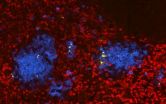(Press-News.org) CAMBRIDGE, Mass. (May 15, 2014) – By studying nerve and liver cells grown from patient-derived induced pluripotent stem cells (iPSCs), Whitehead Institute researchers have identified a potential dual-pronged approach to treating Niemann-Pick type C (NPC) disease, a rare but devastating genetic disorder.
According to the National Institutes of Health (NIH), approximately 1 in 150,000 children born are afflicted with NPC, the most common variant of Niemann-Pick. Children with NPC experience abnormal accumulation of cholesterol in their liver and nerve cells, leading to liver failure, neurodegeneration, and—ultimately—death, often before age 10.
Although there is currently no effective treatment for NPC disease, a clinical trial examining potential cholesterol-lowering effects of the drug cyclodextrin in NPC patients is ongoing. However, research in Whitehead Founding Member Rudolf Jaenisch's lab led by Dorothea Matezel along with Sovan Sarkar suggests that the high doses may actually be harmful. This and other findings are reported this week in the journal Stem Cell Reports.
"At those levels of cyclodextrin (in the clinical trial), Maetzel and her coauthors show that cells encounter a further block in autophagy that could be detrimental," says Jaenisch, who is also a professor of biology at Massachusetts Institute of Technology. "But when they use it at a lower dose in combination with another small molecule, carbamazepine, which stimulates autophagy, then it significantly improves the survival of the cells. Such an approach lowers cholesterol levels and restores the autophagy defects at the same time. This could be a new type of treatment for NPC disease."
To clarify what is amiss in NPC and identify potential therapeutics that could correct these problems, Maetzel generated iPSCs from patients with the most common genetic mutation that causes NPC. She created the iPSCs by pushing skin cells donated by the patients back to an embryonic stem cell-like state. These iPSCs were differentiated into liver and neuronal cells, the cell types most affected in NPC. Along with Haoyi Wang, a postdoctoral researcher in the Jaenisch lab, she then corrected one copy of the causal mutation, in the NPC1 gene, to create control cells whose genomes differ only at the single edited gene copy.
When Maetzel and Sarkar analyzed the cellular functions in the NPC1-mutant and control cell lines, they determined that although cholesterol does build up in the NPC1-mutant cells, a more significant problem is defective autophagy—a basic cellular function that degrades and recycles unneeded or faulty molecules, components, or organelles in a cell. The impaired autophagy prevents normal elimination of its cargo, such as damaged organelles or other substrates like p62, which then accumulates and damages the cells. The finding confirms previous work from the Jaenisch lab linking the NPC1 mutation to defective autophagy in mouse cells.
"Autophagy dysfunction has major implications in several neurodegenerative and certain liver conditions, and therefore autophagy modulators have tremendous biomedical relevance", says Sarkar. "We wanted to screen for compounds stimulating autophagy in human disease-relevant cells and show the beneficial effects of such an approach in the context of a lipid/lysosomal storage disorder."
Maetzel and Sarkar used the two types of human disease-affected cells to screen for compounds known to improve autophagy but not impacting on the mammalian target of rapamycin (mTOR) pathway, which has critical cellular functions and also controls autophagy. They found only one capable of jumpstarting autophagy independently of mTOR in both liver and nerve cells. When this drug, carbamazepine, which is a mood stabilizer prescribed for bipolar disorder, was added in combination with low doses of cyclodextrin, both cholesterol accumulation and autophagy defects were rescued in the NPC-mutated cells.
"From here, this combination of drugs should be tested in animal models to see if it has a beneficial effect," says Maetzel. "Carbamazepine has been approved by the FDA for other uses while cyclodextrin is currently in clinical trail for NPC disease, so we're hoping that this will speed up the testing process. I am optimistic that using human disease-affected cell types to identify potent compounds takes us one step closer to the clinic The hits arising from this cell type-specific screening approach can have broad relevance for other human diseases."
INFORMATION:
This work is supported by the National Niemann-Pick Disease Foundation, the University of Cambridge, UK, US National Institutes of Health (NIH grants R01- CA084198 and HL20948), and the Skoltech Center.
Rudolf Jaenisch is an advisor to Stemgent and Fate Therapeutics.
Rudolf Jaenisch's primary affiliation is with Whitehead Institute for Biomedical Research, where his laboratory is located and all his research is conducted. He is also a professor of biology at Massachusetts Institute of Technology.
Full Citation:
"Genetic and chemical correction of cholesterol accumulation and impaired autophagy in hepatic and neural cells derived from Niemann-Pick Type C patient-specific iPS cells"
Stem Cell Reports, June 3, 2014.
Dorothea Maetzel (1,5), Sovan Sarkar (1,5), Haoyi Wang (1,5), Lina Abi-Mosleh (2), Ping Xu (1), Albert W. Cheng (1), Qing Gao (1), Maisam Mitalipova (1), and Rudolf Jaenisch (1,3,4).
1. Whitehead Institute for Biomedical Research, 9 Cambridge Center, Cambridge, MA 02142, USA
2. Department of Molecular Genetics, University of Texas Southwestern Medical Center, 5323 Harry Hines Boulevard, Dallas, TX 75390-9046, USA
3. Skolkovo Institute of Science and Technology (Skoltech), Novaya Street 100, Skolkovo 143025, Moscow Region, Russia
4. Department of Biology, Massachusetts Institute of Technology, 77 Massachusetts Avenue, Cambridge, MA 02142, USA
5. Co-first author
Combination therapy a potential strategy for treating Niemann Pick disease
2014-05-15
ELSE PRESS RELEASES FROM THIS DATE:
'Bystander' chronic infections thwart development of immune cell memory
2014-05-15
PHILADELPHIA – Studies of vaccine programs in the developing world have revealed that individuals with chronic infections such as malaria and hepatitis tend to be less likely to develop the fullest possible immunity benefits from vaccines for unrelated illnesses. The underlying mechanisms for that impairment, however, are unclear, and distinguishing these so-called "bystander" effects on priming the immune system to fight future assaults versus development of immunological memory has been challenging.
A team from the Perelman School of Medicine at the University of Pennsylvania ...
E-cigarette awareness goes up, as (apparently) so does skepticism
2014-05-15
PHILADELPHIA (May 15, 2014) – Americans are unquestionably more aware of e-cigarettes, those vapor-emitting alternatives to tobacco cigarettes, according to a national survey. Yet, at the same time, the belief that e-cigarettes are safer than traditional smokes may be starting to diminish.
A national survey of 3,630 adults found that 77 percent of the respondents have heard of e-cigarettes; that's way up from 16 percent just five years ago. But the perception that e-cigarettes are actually less harmful than tobacco cigarettes among current smokers decreased slightly, ...
Protein sharpens salmonella needle for attack
2014-05-15
A tiny nanoscale syringe is Salmonella's weapon. Using this, the pathogen injects its molecular agents into the host cells and manipulates them to its own advantage. A team of scientists at the Biozentrum of the University of Basel demonstrate in their current publication in Cell Reports that a much investigated protein, which plays a role in Salmonella metabolism, is required to activate these needles and makes the replication and spread of Salmonella throughout the whole body possible.
The summer months are the prime time for Salmonella infections. Such an infection ...
The color of blood: Pigment helps stage symbiosis in squid
2014-05-15
MADISON, Wis. – The small but charismatic Hawaiian bobtail squid is known for its predator-fooling light organ.
To survive, the nocturnal cephalopod depends on a symbiotic association with a luminescent bacterium that gives it the ability to mimic moonlight on the surface of the ocean and, in the fashion of a Klingon cloaking device, deceive barracuda and other fish that would happily make a meal of the small creature.
The relationship between the squid and the bacterium Vibrio fischeri is well chronicled, but writing in the current issue of the journal Proceedings ...
Synthetic biology still in uncharted waters of public opinion
2014-05-15
The Synthetic Biology Project at the Woodrow Wilson International Center for Scholars is releasing the results of a new set of focus groups, which find continued low awareness of synthetic biology among the general public.
The focus groups also sought opinions on the emerging field of neural engineering.
The focus group results support the findings of a quantitative national poll conducted by Hart Research Associates in January 2013, which found just 23 percent of respondents reported they had heard a lot (6 percent) or some (17 percent) about synthetic biology.
The ...
Added benefit of the fixed combination of dapagliflozin and metformin is not proven
2014-05-15
The fixed combination of the drugs dapagliflozin and metformin (trade name: Xigduo) has been approved since January 2014 for adults with type 2 diabetes in whom diet and exercise do not provide adequate glycaemic control. In an early benefit assessment pursuant to the Act on the Reform of the Market for Medicinal Products (AMNOG), the German Institute for Quality and Efficiency in Health Care (IQWiG) now examined whether this new drug combination offers an added benefit over the appropriate comparator therapy. No such added benefit can be derived from the dossier, however, ...
Mothers' symptoms of depression predict how they respond to child behavior
2014-05-15
Depressive symptoms seem to focus mothers' responses on minimizing their own distress, which may come at the expense of focusing on the impact their responses have on their children, according to research published in Psychological Science, a journal of the Association for Psychological Science.
Depressive symptoms are common among mothers, and these symptoms are linked with worse developmental outcomes for children. The new study, which followed 319 mothers and their children over a two-year period, helps to explain why parenting competence seems to deteriorate as parents' ...
Justifying wartime atrocities alters memories
2014-05-15
PRINCETON, N.J.—Stories about wartime atrocities and torture methods, like waterboarding and beatings, often include justifications – despite whether the rationale is legitimate.
Now, a study by Princeton University's Woodrow Wilson School shows how those justifications actually creep into people's memories of war, excusing the actions of their side. The researchers report in Psychological Science shows how Americans' motivation to remember information that absolves American soldiers of atrocities alters their memories.
"People are motivated to remember information ...
Single episode of binge drinking can adversely affect health according to new UMMS study
2014-05-15
WORCESTER, MA – It only takes one time. That's the message of a new study by scientists at the University of Massachusetts Medical School on binge drinking. Their research found that a single episode of binge drinking can have significant negative health effects resulting in bacteria leaking from the gut, leading to increased levels of toxins in the blood. Published online in PLOS ONE, the study showed that these bacterial toxins, called endotoxins, caused the body to produce immune cells involved in fever, inflammation, and tissue destruction.
"We found that a single ...
Fewer smokers believe e-cigarettes are a safer alternative to cigarettes
2014-05-15
Ann Arbor, MI, May 15, 2014 – E-cigarettes are gaining mainstream attention as a competitor to traditional cigarettes. Researchers from the University of Pennsylvania and the University of Illinois at Urbana-Champaign wanted to examine changes in e-cigarette awareness, how harmful people believe them to be, and if those attitudes have any connection to smoking cessation attempts. They found that while awareness of e-cigarettes has increased significantly, smokers are less inclined to consider them safer than cigarettes. Also, investigators discovered that awareness did ...



